#actually still have his save in Cyberpunk that i need to play someday with the dlc
Text
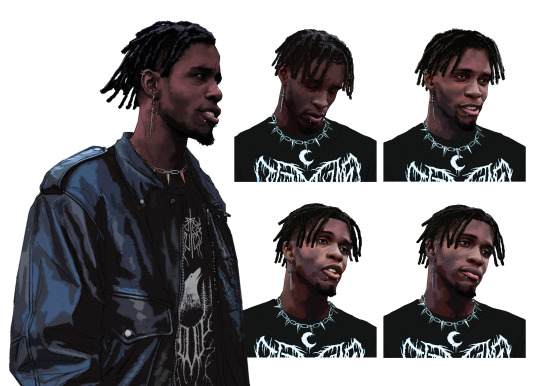
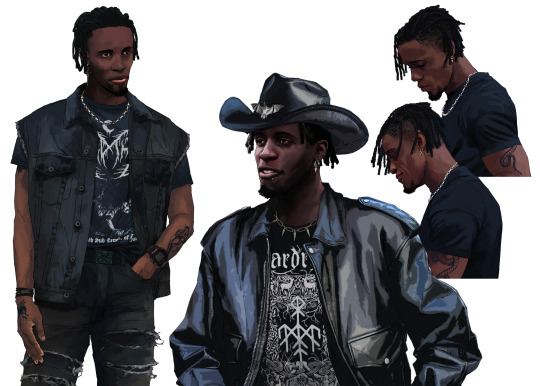
he plays lead, and bass too 💋💅✨
#ocs#oc art#my oc#franck lacazette#kristian hat made a cameo#idk where will he ended up to next probably i will tried and made him in Starfield later#actually still have his save in Cyberpunk that i need to play someday with the dlc
1K notes
·
View notes
Note
So that ask about a Doc Savage/The Shadow crossover (which as an aside, I agree that Doc is probably the worst of the archetype he is functionally the Ur-Example of that isn’t an intentional deconstruction focusing on his worst eugenicist/borderline-fascist aspects to create a villain) has me thinking: what exactly would be the boundaries for a good, well-written crossover between the Shadow and different genres or eras of what we all collectively call pulp? Could someone do a crossover between the Shadow and Indiana Jones that didn’t rely on one or the other being little more than a glorified cameo in a small portion of what was essentially the other’s story, or reducing the former to his lamest two-dimensional “gun-toting homicidal maniac” interpretations? Could the Shadow ever functionally exist in a universe shared with a space opera setting like the Lensman series? It seems like one could theoretically do a crossover between the Shadow and a character of the same era like Nero Wolfe or Sam Spade, but would it strain credulity to attempt it with characters from an updated form of the private detective archetype like Thomas Magnum’s Hawaiian noir or Rick Deckard’s cyberpunk dystopia? Obviously not expecting answers to each of these hypotheticals specifically, just as examples of the kind of thing I’m wondering now.
I will be going through some of your hypotheticals though, you clearly gave a lot of thought to this and it's only fair I respond in turn. I am always eager to respond anyone who wants to ask specifics about writing The Shadow, because much of what I strive to do through this blog is to just inform people about the many, many things that made The Shadow great, the things that have been neglected, and to provide paths anyone who wishes to write the character may take. I'm not sure if I'll ever be able to write The Shadow someday, but the least I can do is spread knowledge as I work my way there. I'd like to think I've done allright so far.
It's a fairly big question though so we're gonna through it by pieces...
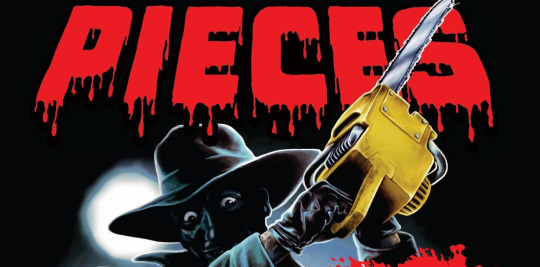
...not THAT way
what exactly would be the boundaries for a good, well-written crossover between the Shadow and different genres or eras of what we all collectively call pulp?
Part of the reason why I did a post yesterday on The Shadow's influences is because looking at them, looking at a character's influences and history, I think are always essential to the prospect of tackling them. And in that regard, The Shadow doesn't actually have much, if any, boundaries stopping him from crossing over with just about anything. The most that's stopping the pulp heroes currently is, besides legal issues, their time periods and obscurity, but The Shadow is the most famous of them all, and a lot of stories have already worked with the idea that he's immortal (which I have my misgivings with, but for better or worse is clearly not going anywhere, and it's not a unworkable concept).
Right from the start, The Shadow was designed to be a long-running, versatile character that could partake in whatever adventures they felt like telling, and part of this is due not just to an incredibly strong personality not afforded to most pulp heroes or characters in general, even those who tried imitating him, but also the fact that he often takes a narrative backseat to the agents and proxy heroes, which means he doesn't have to carry a narrative by his own (and is in fact best suited not to), can blend in to just about anyone's story, and still stand out and be the center of sprawling mysteries. Actually, I'm gonna let Walter Gibson answer this one for you:
While his major missions were to stamp out mobs or smash spy rings, he often tabled such routines in order to find a missing heir, uncover buried treasure, banish a ghost from a haunted house or oust a dictator from a mythical republic.
There was no limitation to the story themes as long as they came within the standards of credibility--which proved easy, since The Shadow was such an incredible character in his own right that almost anything he encountered was accepted by his ardent followers.
Widespread surveys taken while the magazine was appearing monthly showed that a large majority of newsstands sold nearly all their copies within the first two weeks of issue. While other character magazines might show an early flurry, their sales were either spread evenly over the entire period or gained their impetus about the middle of the mouth and sometimes not until the third or even the fourth week.
From the writing standpoint, this made it advisable to adhere more closely to the Cranston guise and to emphasize the parts played by The Shadow's well-established agents, since regular readers evidently liked them. Also, it meant "keeping ahead" of those regulars, with new surprises, double twists in "whodunit" plots, and most exacting of all a succession of villains who necessarily grew mightier and more monstrous as The Shadow disposed of their predecessors.
Always, his traits and purposes were defined through the observations and reactions of persons with whom he came in contact, which meant that the reader formed his opinion from theirs.
This gave The Shadow a marked advantage over mystery characters forced to maintain fixed patterns and made it easy to write about him. There was never need for lengthy debate regarding what The Shadow should do next, or what course he should follow to keep in character. He could meet any exigency on the spur of the moment, and if he suddenly acted in a manner opposed to his usual custom, it could always be explained later.
The Shadow’s very versatility opened a vast vista of story prospects from the start of the series onward. In the earlier stories, he was described as a “phantom,” an “avenger,”, and a “superman,” so he could play any such parts and still be quite in character. In fact, all three of those terms were borrowed by other writers to serve as titles for other characters.
Almost any situation involving crime could be adapted to The Shadow’s purposes
The final rule was this: put The Shadow anywhere, in any locale, among friends or associates, even in a place of absolute security, and almost immediately crime, menace or mystery would begin to swirl about him, either threatening him personally or gathering him in its vortex to carry him off to fields where antagonists awaited.
That was his forte throughout all his adventures. Always, his escapes were worked out beforehand, so that they would never exceed the bounds of plausibility when detailed in narrative form. And that was the great secret of The Shadow.”
In some regards, The Shadow is a mirror. He presents himself to people the way that's best suited to them, the way they'd like him to be, the way he needs to be to affect them. They want money, he has it. They want honor, glory and purpose, he gives them that. They want to fight and turn around social systems for the better, he funds their dreams. Gangsters want the underworld's greatest hitman on their side, he becomes that and lets it be their doom. The story calls for a rich aristocrat who can rub elbows with politicians and kings and presidents, he can do that as long as it suits him. Kent Allard can be a world famous celebrity in one story and a disfigured, broke and faceless nobody in the next. You want a kind janitor with unexpected fighting skill to spy on police and assist the homeless, he has a little someone named Fritz for the occasion. You want an evil monster to be defeated, bring out Ying Ko. Hell, James Patterson's upcoming Shadow novel, which by all reviews seems to be pretty lousy, apparently features The Shadow transforming into a cat. Why? Screw you, that's why! But you'd never see James Bond or Batman spontaneously transforming into a cat without outside interference. He's The Shadow, he's got a face for everything.
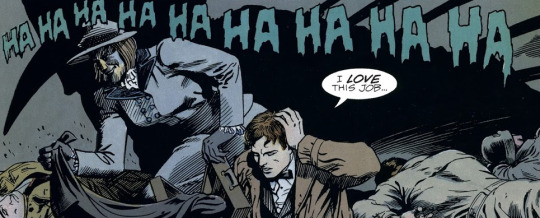
(Okay to be clear I don't actually want the Shadow to literally transform into animals, at least not without a good explanation which the book clearly doesn't provide, but I do think it illustrates my point about how generally weird he is)
He is a shapeshifter who can be just about any character in any given narrative who only reveals himself when it's time to materialize into a cloaked terror or a familiar face (whether it's Cranston or Allard or Arnaud and so on). War stories, romance stories, sci-fi stories, globetrotting stories, parody stories, he's done all of them and then some. He doesn't need to be the protagonist of a story, he doesn't need to be invincible, and he doesn't really have any set rules regarding powerset. Gibson stressed credibility a lot, but for over 70 years now, that's clearly gone by the window of the character's writing. By design, he was always meant to be able to smoothly integrate into any existing narrative. Frankly, the only thing that's really holding him back (or saving him, depending on how you look at it) is the fact that he's not public domain (yet).
I think for a start, it's not so much boundaries, because in make believe land boundaries are just things to be overcome on the way to telling a story, so much as it's a good working knowledge of the character and of how far you are willing to stretch your storytelling limitations to include him, because he can account for just about all of them. Now, obviously there's stuff that works for the character better than others, a lot of Shadow fans don't like it when they take the character too much into fantasy, there's debates on how superpowered should he be if at all, and so forth. I have my own preferences, but one of the bigger tests of long-running characters is how can they succeed and thrive when placed outside of their element, and The Shadow can do that.
Could someone do a crossover between the Shadow and Indiana Jones that didn’t rely on one or the other being little more than a glorified cameo in a small portion of what was essentially the other’s story, or reducing the former to his lamest two-dimensional “gun-toting homicidal maniac” interpretations?
would it strain credulity to attempt it with characters from an updated form of the private detective archetype like Thomas Magnum’s Hawaiian noir
Well regarding the first question, the latter portion I think is very easy to do. Just, don't write him like that. Just be aware of why that's a mischaracterization, why the character doesn't need that to work, why he works better without it, and so on. It shouldn't be that hard.

Regarding Indiana Jones and Thomas Magnum, I think these two actually lend themselves very easily to crossovers with The Shadow. On Indy's case, he already is a Pulp Hero operating in the same time period, who's got a heavily contrasting niche and personality to build a fun dynamic around. Indy is more story-driven, in the sense that the Indiana Jones moves are all centered around his experiences and point of view and growth as a person, compared to The Shadow's stories, which are not really about "his" story as much as they are about the stories of the people he comes in contact with. Indy is a blockbuster superstar while The Shadow lurks and slithers through the edges and cracks of a story until it's time to strike. But if anything that just makes even more of a case as to why they could team up without issue, since there's a further built-in complimentary contrast to work with.
I have never watched Magnum P.I so there's definitely stuff I might be missing, but looking him up, past the necessary explanation as to why The Shadow's hanging around the 80s, it wouldn't strain credulity at all for the two to team up. The Shadow has had Caribbean/beach-themed adventures and one unrecorded adventure in Honolulu, he has a beach bum secret identity called Portuguese Joe that he could use for this occasion, and Magnum seems like exactly the kind of character who could star as the proxy hero of a Shadow novel. He's lively and friendly and can look after himself, he has a job that leads him to trouble and puts him on contact with criminals as well as victims, he's got secrets and a dark past and a laundry list of character flaws, he's perfectly capable of carrying a story by himself but can be out of his depth in the schemes that he gets caught up in.
Could the Shadow ever functionally exist in a universe shared with a space opera setting like the Lensman series? Or Rick Deckard’s cyberpunk dystopia?
I'm going to tackle parts of this question more throughly when I answer one in my query that's asking me "How would you do The Shadow in modern day?", which I still haven't gotten around to answering because it's a tricky one. I won't go into the specifics for the two examples you listed because I've never read the Lensman books and googling about them hasn't helped much very much, and Deckard's a fairly standard P.I character mostly elevated by the movie he's in, there's not really much to discuss regarding him specifically interacting with The Shadow. The question you're asking me here seems to generally be: Could The Shadow functionally exist in settings so radically apart from the 30s Depression era he was made for?
My answer for this is a maybe leaning towards yes. Starting with the fact that the concept of The Shadow is more suited for allegorical fantasy along the lines of space operas and cyberpunk, than the gritty realism he's been saddled with for decades, which I'll get into another time. For some reason, a lot of people seem to harp on about how the Shadow's costume is impractical and unworkable for modern times, and said James Patterson novel mentioned above ditched it all together, which as you can guess was a massively unpopular decision. Matt Wagner talked once about how cities don't have shadows and men wearing hats anymore and that's part of why you can't have The Shadow in modern times (as if The Shadow was always supposed to be dressing like an average guy, and not cowboy Dracula). But nobody seems to have a problem with characters dressing up exactly like The Shadow showing up all the time in dystopian future cities with fashion senses where they stick out like a sore thumb (and really, they should stick out, otherwise what's the point of being all weird and dark and mysterious?)
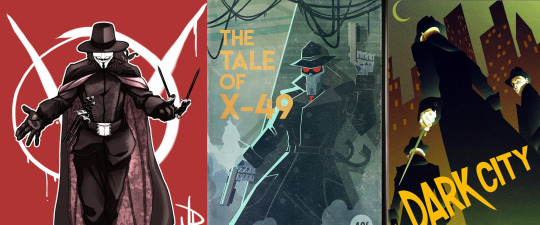
Although The Shadow is specifically suited for urban settings, is conceptually rooted in 1930s America, and there are important facets of his characterization related to history like the Great War, there are not the be-all end-all of The Shadow. It's part of the character. Other parts integral to the character are, as mentioned above, the versatility and metamorphous nature he was always intended to have. His nature as a character who exists to thrive in narratives not about him and not centered around him. His roots on Dracula and King Arthur and Oz and Lupin which are concepts that have had so, so many drastical revisions and turnabouts that still stuck to the basic principles of the icon.
Besides, The Shadow's already been there. He's already been to space, he's already been in alternate dimensions, he's already reawakened in modern/future times several times now (when he doesn't just live to them unchanged). He's been a cyborg twice, and between those, El Sombra, Vendata, X-9, the Shadow-referencing robot henchmen from Bob Morane and Yu-Gi-Oh's Jinzo referencing the movie's bridge scene, it's enough to constitute a weird pattern of The Shadow and Shadow-adjacent characters turning into robots. Perhaps one positive side effect of The Shadow's decades-long submersion in fantasy is that it's opened the character for just about anything, and I think this could be a good thing if it was married to an adherence to the things that made him such a juggernaut of an icon in the 30s and 40s.
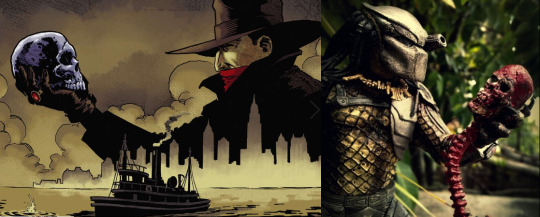
Really, The Shadow partially works on Predator rules. And by that I mean, the big secret of the Predator that filmmakers don't seem to get is that the best way to make a Predator film is to just put the Predator somewhere he's not supposed to be, and let that play out. Because the Predator is, by design, a trespasser who invades narratives and turns the power dynamics around, and that works for any narrative you put it into.
The first movie is all about setting you up for a jungle action movie with Schwarzenegger's Sexual Tyrannosaurus Crew as the biggest baddest death squad around, only for the Predator to appear, turn the tables on these shitheads and pick them off one by one until Arnie scrapes a victory by beating it at it's own game. The 2nd movie is about a drug war between cops and gangs in L.A, until the Predator shows up and suddenly he's the big problem again that's gotta be put down. All the other movies fail because they try to be "about" the Predator, but the Predator doesn't work that way. He's a ugly motherfucker who's here to fight and kill things in cool ways for the sake of it's warrior game, who already has a specific structure to how his story's meant to play out, and that's all he needs to be. What you do is just take that character, take the structure he carries around, and throw it somewhere that works by different rules, and let the contrast play out the story.
Obviously there's a lot more to The Shadow than this, I write a billion essays on the guy after all, but much of what makes The Shadow work, much of what made The Shadow such an icon at the decade of his debut and such an interesting character to revolve any kinds of stories around, was because of the great contrast he posed to everything surrounding him, and the ways he can both be at the forefront as well as the backseat of any story.
Going back to what Gibson said:
Almost any situation involving crime could be adapted to The Shadow’s purposes. He could meet any exigency on the spur of the moment, and if he suddenly acted in a manner opposed to his usual custom, it could always be explained later.
The Shadow was such an incredible character in his own right that almost anything he encountered was accepted by his ardent followers.
advisable to emphasize the parts played by The Shadow's well-established agents, since regular readers evidently liked them.
The keyword here isn't that the Shadow should be realistic, frankly that's always been a lost cause. He was never really that realistic, and it's unfair to expect writers to keep pace with Gibson who had lifelong experience with the in and outs of magic and daring escapes and whatnot. The keywords I want to stress here is "accepted by his ardent followers".
Make a good explanation, an explanation that fits the character, an explanation that works, and the rest will follow. And if you can't, make us like the character. Make us accept that he can do and be all these things. Give us something to be invested in. And if that can't be The Shadow himself because he has to stay at arms length constantly to be mysterious, Gibson cracked the code almost a century ago through the agents. Make us invested in them, and through them, we will become invested in The Shadow.
The pulp Shadow would get tired, get injured, need rescuing, need to stop and rest and catch his breath, would need to think and plan and make split decisions on the spot and sometimes would make the wrong ones only to reverse them in the nick of time, and it made the fact that he was achieving all these things all the more impressive. The pulp Shadow was a creature of fantasy grounded in the history of the world he was a part of.
If you can make people care about The Shadow, be truly, genuinely invested in him and his world and the people he comes in contact with, be as invested in those as audiences were back then, you can and maybe should put him anywhere, doing anything, as long as you know what you're doing. As long as you understand what makes The Shadow tick, what makes him work and what doesn't, and whatnot.
Which is a lot of words for "do whatever you want, just don't fuck it up"
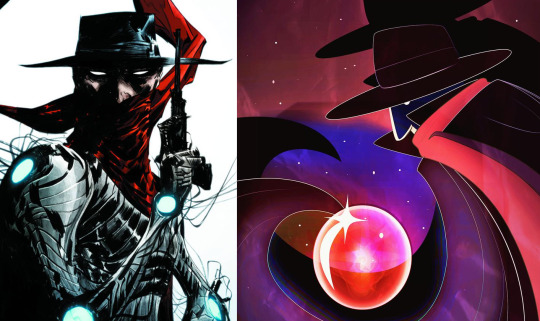
#replies tag#pulp heroes#pulp fiction#the shadow#lamont cranston#kent allard#the predator#indiana jones#thomas magnum
20 notes
·
View notes